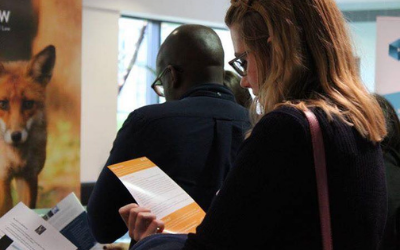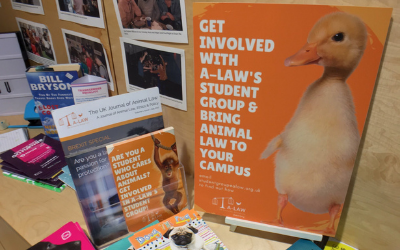Aditi Bardia (A-LAW Student Ambassador) interviews Sonia Shad (Manager of the Animal Law Centre, NALSAR)
Q. What is the present situation in India with regard to Animal Protection Laws?
Animal law in India is intricately beautiful. It is an amalgamation of constitutional, criminal, and civil law that impacts not just animal welfare but human welfare and environmental conservation too.
While India has the anti-cruelty specific legislation that applies to all animals, and rules framed thereunder that address specific issues with animal welfare, there are also a lot of interconnections between animal welfare and allied sectors, like child welfare, human rights, labour welfare, food safety, public health etc. This interconnection is what makes this field of study so interesting and relevant for public-spirited citizens.
Although we do have a relatively good legal framework for animal protection in India, lacunae in regulation exist, including that of a lack of surety of action by police. Penalties in our anti-cruelty legislation are extremely low and need to be increased. Also, in India, implementation remains a challenge. We believe that this one-of-a-kind programme — the MA/Advanced Diploma in Animal Protection Laws at NALSAR — will increase accessibility to the broad scope of animal laws in India for both the public and law enforcement agencies.
Q. NALSAR has also been offering a one-year post-graduation diploma course in Animal Protection Laws. What kind of response has it garnered?
We have had extremely positive feedback from the PGD programme in Animal Protection Laws, with more than 100 students in the past two years. This has encouraged us to curate more detailed and holistic courses that will move beyond just animal protection laws and look at the laws in allied sectors and study its intersection with animal law.
PGD students particularly enjoyed learning from the country’s leading experts working in this space, who were able to provide them with many real-life examples of how to utilize laws to protect all animals whether wild, companion, or farmed. Most attendees said that the programme helped with understanding the ground realities and importance of animal protection, the ethics in animal welfare, the balance of human-animal interests, and how to take pragmatic impact driven actions while working for animal welfare.
Students are allowed to opt for a one-year advanced diploma course or continue to the two-year masters course.
Q. What is the reasoning behind setting up this programme?
The law is a powerful tool for change, and when used effectively it can protect the most disadvantaged members of our society. There are billions of animals in India that are deprived of legal protection, and this is often due to people’s lack of awareness of the law. Animal welfare and human welfare are so intrinsically tied together that building a just, kind, and sustainable world requires us to look at how law and society perceive, treat, and protect animals. Through this course, we aim to provide participants with the tools they need to make effective changes for animals.
On a personal note, when I was a student, there were no opportunities available to prepare me for the work I wanted to do. Being able to help create a programme that will give people an opportunity to learn everything I wish I had access to — from the basics of anti-cruelty legislation, wildlife protection laws, and biodiversity conservation legislations to the laws surrounding funding, NGO compliance, and how to work with government bodies — is truly heartening.
The positive response we received for the post-graduate diploma programme and support from NALSAR and HSI/India also encouraged and enabled us to work on our previous programme and make it more holistic, intersectional, and comprehensive.
Q. What are the aims and objectives of this programme?
The first group of students will have the rare opportunity to pick the best minds from the safety of their homes and have a truly global experience.
Through this programme, we aim to create experts, be it lawyers or other professionals in varied sectors, catering to and specializing in the animal laws in India, as well as international laws. Our programme participants will have a sound and strong foundation in legal and jurisprudential patterns of animal rights and animal welfare issues, and they will be well equipped to handle practical, contemporary challenges faced on the ground regarding cruelty towards animals, policy development, conservation, and litigation in ancillary matters regarding animal-specific industries.
As we are an interdisciplinary programme, above all else, this course aims to provide all individuals with the tools to bring forth meaningful impact, both while specifically considering animal welfare as a primary objective and also recognising animal welfare as one factor in a broader context of welfare.
Q. Is a candidate required to have pursued an undergraduate degree in law for enrolling in this programme?
No, a prior knowledge of law, or an undergraduate degree in law, is not necessary for this programme. This course is targeted towards working professionals both in animal welfare and in other allied sectors like environmental protection, public health, mitigation of violence, and cruelty against all species, human welfare, education etc. It has been designed in a manner to ensure that non-lawyers are also able to make the most out of the legal classes and learn how to use the law to augment their work.
The course is also specifically beneficial to practicing lawyers who wish to gain a more in-depth understanding of animal protection laws and how they interact with other laws. It would benefit individuals who are working with departments and bodies that make decisions on the conditions and lives of animals. It would benefit any other person that wishes to grow their effective compassion towards ending suffering for all living beings.
Participants who wish to apply are required to have a bachelor’s degree or an equivalent degree in any discipline from any recognized university, or to be currently appearing for the final year examination for their graduation.
Q. What kind of impact on animal welfare do you foresee through this programme?
While there is a plethora of laws that protect animals in India, there is no comprehensive source of these laws, and implementation remains a constant challenge. We believe this programme will help mitigate the aforementioned issues by creating experts, whether animal advocates or lawyers, and helping them gain the tools they need to create greater impact with their work. We also hope this programme will encourage cross-sector collaboration, as it aims to instil an understanding of how different welfare sectors can benefit from collaboration to tackle the biggest harms in our current society.
Q. What are the future career pathways and professional opportunities for someone in this programme?
For participants of the programme, career prospects range from taking up full-time legal practice in the field of animal law, working alongside law enforcement/governance/justice systems, working in the field of conservation and wildlife protection, working in NGOs for animal welfare or allied NGOs working on intersectional campaigns, working in public policy, academia and research think tanks focused on animal protection, sustainability, environment protection, and more.
This is a burgeoning field in India, and we have been privileged to witness the growth through the increase in demand for programmes and courses offered by the ALC.
We believe this one-of-a-kind programme will help train, empower, and bring out changemakers and decision-makers in this field through our Masters/Advanced Diploma programme, who can lay the path forward in the decades to come.
If you are interested in applying for the programme, find more information at nalsarpro.org. Applications are due September 15.







